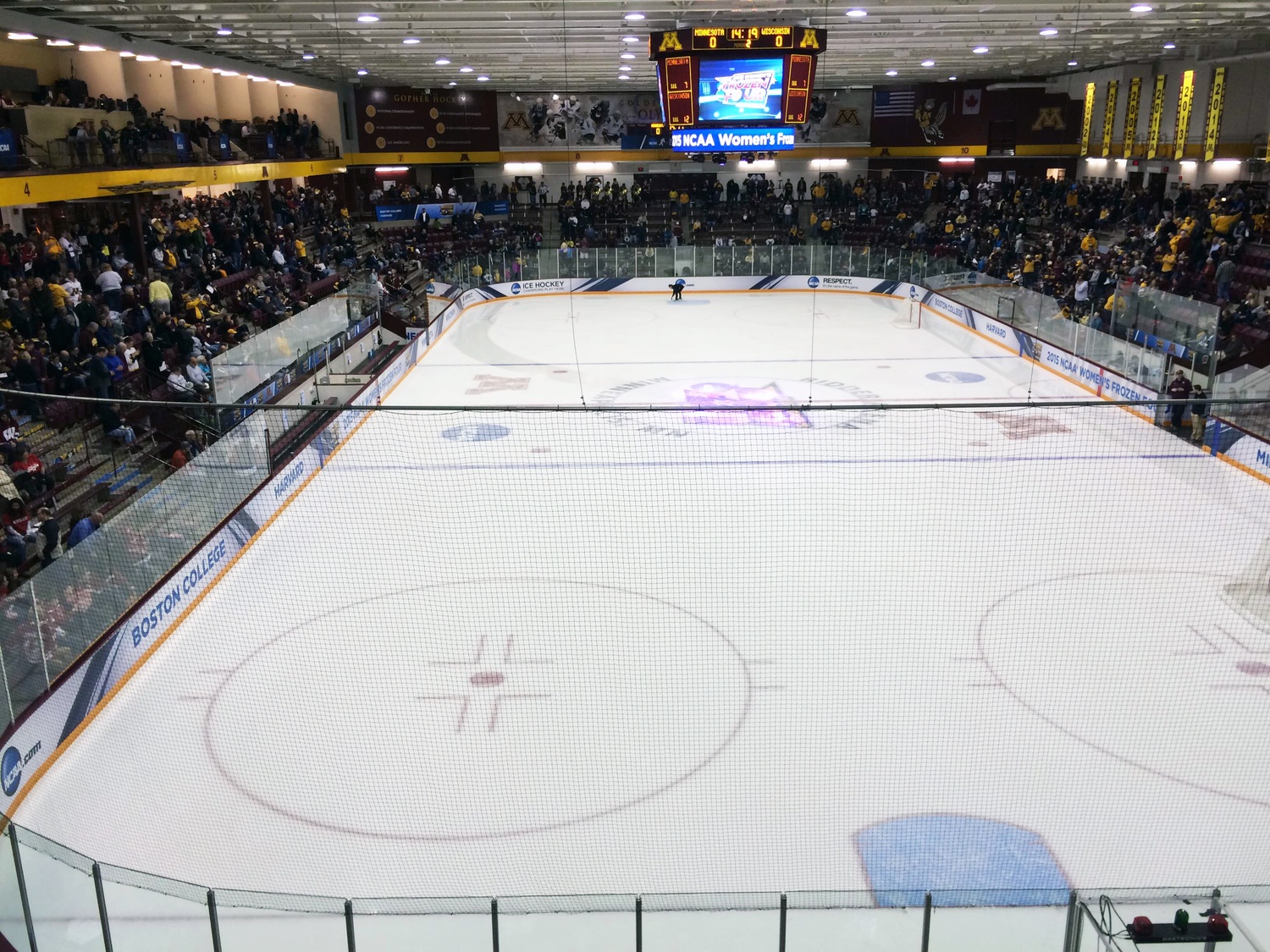
News
Cambridge Residents Slam Council Proposal to Delay Bike Lane Construction

News
‘Gender-Affirming Slay Fest’: Harvard College QSA Hosts Annual Queer Prom

News
‘Not Being Nerds’: Harvard Students Dance to Tinashe at Yardfest

News
Wrongful Death Trial Against CAMHS Employee Over 2015 Student Suicide To Begin Tuesday

News
Cornel West, Harvard Affiliates Call for University to Divest from ‘Israeli Apartheid’ at Rally
The Pregame Huddle: Unseen Storylines in Minneapolis
Crimson staff writer Sam Danello reflects on buildup leading to tonight's Frozen Four matchup

Sports reporters don’t tell the whole truth.
Yes, we relay exact statistics; yes, we transcribe exact quotes. But when it comes to describing exactly what happens on a grassy field, an icy rink, or a hardwood floor, we whisk together a few summary phrases and advertise the product as the whole truth.
In doing so, we betray the backstory. It’s often a choice of expedience: in order to cover what occurs beneath the spotlight, you need to treat the past as periphery. This attitude may be efficient, but it also fails to explain the richness that defines big contests. Before any famous game, after all, there are anonymous hours.
The month of March accentuates this flaw of live sports journalism. You may not know what UAB stands for, but you can confirm that the UAB men’s basketball team beat Iowa State, 60-59, on some late-game heroics. The spotlight jerks from one Cinderella to the next, and sportswriters generate skeleton headlines, not full-bodied explanations.
Tonight the jumpy gazes of many sports fans will come to rest on the Harvard women’s hockey team, as it takes on Boston College in a Frozen Four national semifinal. For an hour or two, thousands of spectators will revel in a contest that feels like a stand-alone moment but is, in fact, the culmination of a long chain of events that stretches back to the beginning of the season in October, if not earlier.
The full backstories behind the event are unknown and unknowable. As a reporter or a fan, you can only caricature the years of preparation that will culminate in tonight’s contest; what we see is only a fraction of what appears on the ice.
Yet we can’t dismiss the invisible forces that have propelled the Eagles and the Crimson to the edge of a national championship. In so many ways, these histories, which are impossible to fully comprehend as outsiders, are the drivers of the intensity of events like the Frozen Four.
Nearly six months—that’s how long the Crimson’s season has lasted. That’s six months of team practices you never attended. Six months of strategy talks you never heard. Six months of private struggle you never saw—but that all still has built up to this singular moment.
Only 26 players in the world know the precise weight of the six-month burden, and these 26 will be in the Harvard locker room tonight.
Although we can’t provide an exact account of what this matchup weighs, we can at least do some guesswork. It helps that in this case, the matchup seems to weigh so much.
For senior forwards Hillary Crowe and Samantha Reber, the Frozen Four means a return home. Reber and Crowe are the only Minnesotans on the Crimson’s roster, and they inevitably must confront the pressure of playing in a familiar place in front of familiar faces.
What does this pressure actually entail? No one except the pair of natives can know for sure, but it seems probable that playing in a home state brings flashbacks of all those private actions—skating sprints, slapping shots, taping sticks—that have led up to this public moment.
“Being in my senior year now, playing for a national title in Minnesota with this group of girls, is a dream come true,” Reber said. “It just means so much more...to be playing this game here.
Crowe and Reber fall into a second category of Harvard players who must think about more than the Eagles as they ready for the semifinal matchup. The two forwards are members of a seven-person senior class, and for this group, Friday could potentially mark the last contest with the team.
This squad of seniors has overseen an impressive four-year era in Crimson hockey, one in which the squad has never finished below 20 wins in a season. One item lacking from this resume, however, is a Frozen Four appearance, and Friday’s game marks new territory for this reason.
“It’s in the back of my mind,” Reber said. “More than anything this weekend, I want to leave everything out on the ice and do everything I can to help our team get to where we want to be.
For Harvard coach Katey Stone, the game against BC means another Frozen Four experience, albeit her first since 2008. That year, the team lost to Wisconsin, 4-1, in the semifinal contest.
Stone has had an impressive run since then, including a stint as the Olympic head coach. But a second national championship would surely prove valuable to the legacy of the coach with the most wins in women’s Division I college hockey history.
“We’ve got to focus on the things that we do well,” Stone said. “If we’re going to play our game, we better remember what we value and what’s gotten us to this point.”
Of course, in order to perform at the highest level, Crimson players will try to push these large-scale thoughts to the sideline as much as possible. That’s no small task given the size of the stage.
Even if Harvard players succeeding in forgetting their various burdens, they can’t cast them off. The intensity of the Frozen Four derives from such emotional storylines, and like the game itself, the emotions belong solely to the players.
—Staff writer Sam Danello can be reached at sdanello@thecrimson.com.
Want to keep up with breaking news? Subscribe to our email newsletter.
